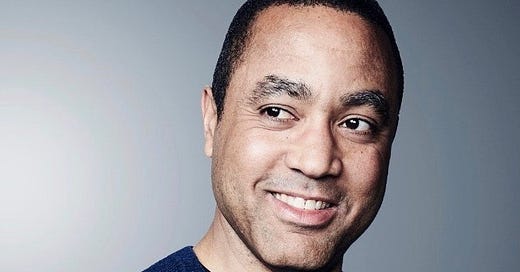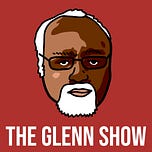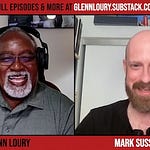As I mentioned at the start of our latest subscriber-only Q&A episode, John McWhorter recently received the 2022 Philip Merrill Award for Outstanding Contributions to Liberal Arts Education, bestowed by the American Council of Trustees and Alumni. According to the ACTA, the award honors “individuals who have made an extraordinary contribution to liberal arts education, core curricula, and the teaching of Western Civilization and American history.” Perhaps I’m biased, but I can think of no one who more richly deserves such recognition, and so I was proud to be asked to deliver some remarks in tribute to John at a ceremony, which I offer below. (I’ve also recorded an audio and video version for those who prefer to listen and watch. The audio is available now, video will uploaded tomorrow.)
Next month will mark the fifteenth anniversary of my first recorded dialogue with John. Since that first episode, the two of us have experienced much. The beginnings and ends of marriages, the loss of loved ones, the birth of children and grandchildren, not to mention changes in political orientation and new career paths. Through all of that, John and I have kept talking to each other. I think those conversations are important for the reasons I state below. But equally important to me is the friendship that has allowed us, despite our differences, to keep the dialogue going. Without that bond, we may have been able to continue the conversation, but it would not have meant nearly as much to me as it does.
This post is free and available to the public. To receive early access to TGS episodes, an ad-free podcast feed, Q&As, and other exclusive content and benefits, click below.
There are things that don’t—or can’t—get said when we talk about race in most venues in America. Those who have followed the 15-year-long conversation on this topic that I have been undertaking with John at The Glenn Show know what I’m talking about, whether it’s crime in black communities or out-of-wedlock birthrates, academic underperformance or the unbearable intellectual lightness of anti-racism agitation. In academia, in mainstream publications and media outlets, and increasingly in K-12 classrooms, what I’ve called “the bias narrative” holds sway. Negative aspects of black life are attributed almost entirely to the nation’s history of racial oppression, which is said to begin in the early seventeenth century and to continue unabated to this day. We are said to be a bandit society built on genocidal plundering undertaken by unrepentant racists.
That’s one story you could tell. And if that story were just one of many circulating through our national discourse, it wouldn’t be the worst thing. But this “bias narrative” has become not just one of many stories. It’s now the only story on newspaper opinion pages, in scholarly journals, and in educational materials disseminated throughout our schools. It’s the story told by the White House. It’s the story that ramifies out from the most elite precincts of our country and shapes ordinary conversations and relations between individuals. Its grip on so many areas of the public imagination has become so tight that anyone challenging it is viewed with suspicion and, often enough, outright contempt. If an alternate explanation for black underperformance is proffered, it’s not the explanation that gets challenged but the individual making it. For to challenge this narrative, ipso facto, proves that one is a racist, or a deplorable or, if the challenger is a black man, an Uncle Tom.
This situation is intellectually infantile and morally bankrupt. How we talk and think about race has consequences that can be measured not just in dollars and cents but in stagnant lives and dead bodies. So, responding with ad hominem attacks to any account of our current predicament that is not rooted in bias isn’t merely unfortunate, it is actively damaging. The stakes are enormously high here and the hour is late. Candor, integrity and courage are in short supply. Name-calling and character assassination have largely replaced open debate, while naked emperors, pseudo-academics, and bombastic demagogues command the public square.
Enter John and Glenn. Or as I sometimes like to refer to our duo, enter the WokeBusters!!
In Hans Christian Anderson’s story “The Emperor's New Clothes,” two swindlers promise to provide an emperor with magnificent new clothes that will be invisible to those who are too stupid or incompetent to see them. Officials see plainly see that no clothes are being produced on the swindler’s looms, but none of them will say anything to avoid being thought of as a fool. So when the emperor walks through the city in his new “clothes,” everyone can see that he is naked, but no one will be the first to say it. But then comes along an innocent child who, in his naïveté, is willing to defy this false consensus and speak out.
The thing about the child in that story is not that he’s saying it. It’s not even that other people hear him say it. It’s that everybody knows that everybody else has heard him say it. The child has created a situation in which it becomes common, shared knowledge that the emperor has no clothes. Everyone now knows that everyone knows the truth.
German political scientist Elisabeth Noelle-Neumann coined a term that describes this phenomenon: the “Spiral of Silence.” In a spiral of silence, when holding a certain view entails a stigma then people stay silent for fear of being seen as having that view. Thus the masses believe they are alone or in a small minority of people with the stigmatized view, when in fact they are indeed one of the masses.
In progressive-controlled areas of our society today, we are suffering from a spiral of silence when it comes to the topic of racial justice. A great many Americans don’t like it when Colin Kaepernick takes a knee at a football game and says, “I’m not going to stand for this national anthem,” or when a Black Lives Matter activist rises with his balled fist and says, “Burn this city down.” But they are afraid to be the only one in their community saying it, to be perceived either as racist or as a supporter of racism, for holding mild views that, arguably, most of America holds, views such as the obvious fact that “White lives matter, too!”
There is a deeper point here. Though overt censorship is often spoken of as the leading threat to open discourse, the more subtle threat arises from the voluntary limitation of one’s own speech that create a spiral of silence. As John Stuart Mill recognized in his masterwork On Liberty, it is not the iron fist of state repression but rather the velvet glove of society’s seduction that constitutes the real problem.
Who, we must ask, will speak for compromise and common sense, when to speak in this way is seen to signal a weak commitment to “the struggle”? Who will insist that we speak plainly and tell the truth about delicate and difficult matters (such as, the despicable black-on-black violence now ravaging many of our cities), matters that we would all prefer to cover-up or ignore? Who will declare “the emperor” to be naked? How can a nation sustain an elevated political discourse, when the social forces of conformity which promote silence threaten to usher in a dark age? In truth, it cannot. But, with a simple choice, with just a little bit of bravery, you and I can choose to be like that child who spoke truth to the empire. We can put an end to the gaslighting, the lying, and the willful blindness to reality on issues of race and social justice that are so characteristic of our time.
My friend and longtime conversation partner, Professor John Hamilton McWhorter, IV, with his books, opinion pieces, and via his public ministry at The Glenn Show has, for nearly a quarter-century, been pointing the way. It is now up to those of us who are committed to an honest engagement with this age-old American dilemma of race and social justice to follow his lead, if only we dare do!
Thank you.














Share this post